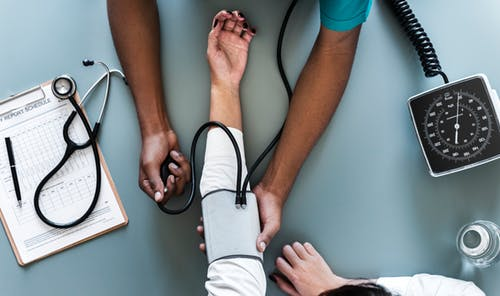Hypertension, or high blood pressure, is an all-too-common health condition among Americans. It persists mostly because of unhealthy habits, and carries with it even more serious health risks.
According the U.S. Centers for Disease Control and Prevention (CDC), “About 1 of 3 U.S. adults—or about 75 million people—have high blood pressure. Only about half (54%) of these people have their high blood pressure under control.” Are you one of these 75 million? Are you at risk for the condition?
What is hypertension?
Hypertension is the medical term for high blood pressure, and is characterized by higher than normal blood pressure that puts excessive force on the walls of blood vessels. The American Heart Association has established hypertension as having blood pressure that is higher than 130 over 80 millimeters of mercury (mmHg).
With almost no warning signs or symptoms, most people are not aware that they have the condition until they have their blood pressure checked. Because having hypertension or high blood pressure is significant risk factor for the development of heart disease and stroke, it is oftentimes referred to as the “silent killer.”
With timely and appropriate preventive measures, however, high blood pressure can be avoided or controlled.
What are the causes and risk factors?
Hypertension is often caused by an underlying condition or certain medications. Acute hypertension may be caused by chronic kidney disease (CKD), when the kidneys are unable to effectively filter out fluid.
Risk factors include:
- Being 60 or older, when plaque build-up inside arteries make the vessels narrower and stiffer, which increases blood pressure.
- Being overweight or obese.
- Lack of physical activity.
- A diet high in salt, usually from processed foods.
- A diet lacking in potassium.
- Being a smoker.
- Being a heavy drinker.
- A family history of hypertension.
- Existing health conditions, such as cardiovascular disease, CKD, diabetes, and high cholesterol levels, or a family history of these conditions.
- Chronic stress.
- Certain medications.
- Belonging to an ethnic group that is susceptible to the condition.
How is hypertension managed and treated?
Because hypertension is often associated with unhealthy habits, a change in lifestyle is also the primary mode of treatment for the condition. Lifestyle changes also offer great benefits for stress-reduction and overall improvement of one’s health.
Engaging in regular and moderate-intensity aerobic exercises, such as cycling, jogging, swimming, or walking helps make the heart stronger and function more efficiently. Physicians recommend exercising for at least 30 minutes per session, 5 to 7 days a week.
Dietary changes are also often required for some cases of hypertension, particularly those that are caused by an unhealthy diet of high-salt and high-fat content processed foods.
Whether or not an individual already has hypertension, the WHO recommends reducing salt intake to less than 5 grams a day; this measure offers great benefits to people who are already hypertensive.
Switching to a diet that minimizes consumption of processed and fatty foods, or completely eliminates these foods, is also prescribed by doctors, particularly for patients who are overweight or obese and are at an extremely high risk for cardiovascular disease and stroke. Managing body weight through a combination of a healthy diet and regular exercise is the best strategy to manage hypertension.
Moderating alcohol consumption is recommended for heavy drinkers. Quitting smoking is another lifestyle change that is almost always non-negotiable to successfully manage hypertension and prevent serious complications.
Medications are also often prescribed to treat acute or chronic hypertension, particularly patients whose blood pressure is higher than 130 over 80.
How can you prevent developing hypertension?
If you have any of the risk factors for hypertension, it is even more important that you take the necessary steps to prevent the development of the condition.
Having a nutritionally-balanced diet and minimizing consumption of processed and fatty foods and exercising regularly are the effective preventive strategies.
You should also visit your primary care physician for regular check-ups so you and your doctor can better monitor any abnormal changes to your blood pressure.
Needless to say, you should also keep drinking alcohol to a minimum and avoid using tobacco.
Book an appointment with a HOMA family medicine doctor soon to find out if you are at risk for hypertension.

